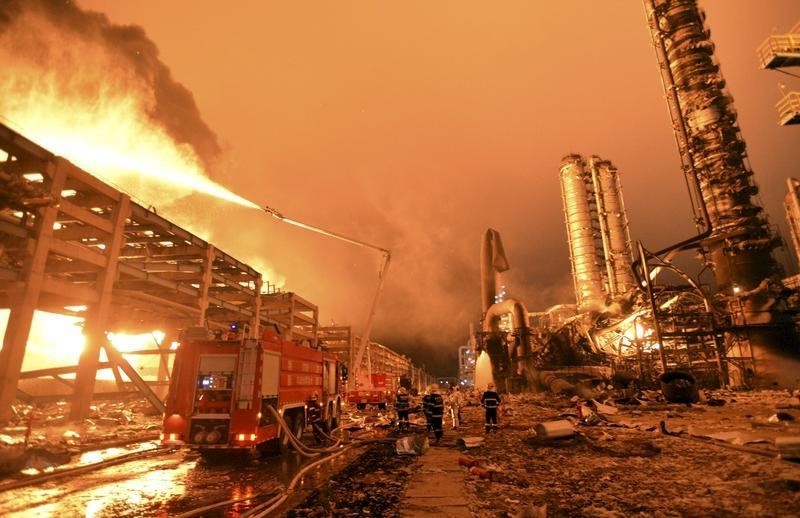By Chen Aizhu
BEIJING (Reuters) - Chinese state energy giant Sinopec Corp (HK:0386) is in advanced talks on taking a controlling stake in petrochemical firm Dragon Aromatics, which operates one of the country's biggest chemical plants, three sources with knowledge of the matter said.
The discussions come after the independent petrochemical firm suffered a second major fire in less than two years at the $3 billion (1.94 billion pounds) plant in Fujian and sources said local authorities want Sinopec to participate before allowing the plant to reopen.
The tough line shows how Beijing is putting pressure on provinces to ensure better industrial safety standards and protect the environment after a series of accidents has stirred protests from residents opposed to plants in their backyard.
Dragon Aromatics, owned by Taiwan's Xianglu Group, was forced to shut the plant with a capacity to produce 1.6 million tonnes a year of paraxylene (PX), a chemical used to make polyester fibre and plastics, after the fire in April.
"This is what the local government has insisted: without Sinopec's participation the plant won't be allowed to resume operations," said one of the sources, who declined to be named due to the sensitivity of the discussions.
Sinopec could take up to 80 percent of the stake, the source added.
Sinopec spokesman Lu Dapeng declined to comment.
A senior Dragon Aromatics official said that he was not in a position to comment on the communications at the board level but told Reuters the firm was "trying every means to resume the plant's production as soon as possible."
The PX plant is located on a peninsular called Gulei, part of Zhangzhou city and a site where state firms including Sinopec and China National Offshore Oil Corporation (CNOOC) had previously tried to build petrochemical plants.
Calls to the press department of the Zhangzhou municipal government were not answered, while an official on the management committee of the Gulei economic zone did not respond to a fax seeking comment.
TIANJIN DISASTER
Industrial safety has come under heightened scrutiny in China since a devastating explosion in August at a chemical warehouse in Tianjin port that killed 160 people.
Sinopec, China's largest oil refiner and petrochemical producer, wants to build more PX facilities but at least two of its investments have been blocked over the last few years due to opposition from residents worried about pollution.
"It would not be a bad deal for Sinopec, as it would save it all the trouble of going through the lengthy regulatory and environmental approvals," said a second source with a firm that has a supply agreement with Dragon Aromatics.
In Fujian, local officials including a vice mayor have been punished over April's accident, which was blamed on lax quality control and safety management, according to a report on the state news agency Xinhua in August.
Sinopec, regarded as a seasoned petrochemicals operator, may need to retool the plant to improve safety standards, the sources said.
The purchase could also allow Sinopec to increase its purchases of Iranian oil as sanctions are relaxed.
To supply the PX plant, Dragon Aromatics also runs a 100,000 barrels per day condensate splitter and a 3.2 million tonnes per year hydrocracker at the site.

Dragon Aromatics has been one of the biggest buyers of Iranian condensate, a very light crude oil, and the plant shutdown has forced the Middle Eastern producer to store more of its oil.